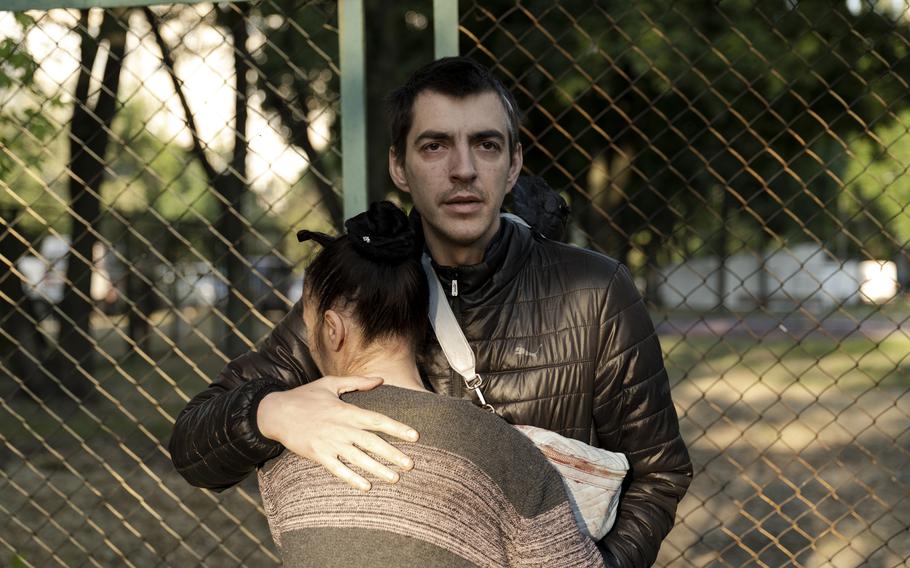Europe
‘It was negligence’: A family fleeing missiles in Kyiv met a locked shelter
The Washington Post June 2, 2023

A neighbor cries on the shoulder of Yaroslav Riabchuk, whose wife was killed hours before when they couldn't access a bomb shelter in Kyiv on Thursday. (Sasha Maslov/The Washington Post)
KYIV, Ukraine — When the air raid alarm blared across Ukraine’s capital at 2:49 a.m. Thursday, Yaroslav Riabchuk and his wife and daughter rushed outside to find shelter, as they often did, in the nearest basement: a medical clinic in front of their apartment building.
But on this morning, for some reason, the clinic’s doors were locked.
In the darkness, a group of 10 families with children banged on the doors with their hands and feet, pleading to be let inside, Riabchuk said. He ran to the other side of the building to find another entrance. Then he felt the blast.
Ukraine’s air defenses had intercepted an attack, and the explosive force was powerful enough to blow out the windows of nearby apartment buildings. Debris crashed down around the clinic.
“It was chaos. My daughter was screaming. Everyone was screaming,” Riabchuk said. “I was hoping it was not my wife.”
“I tried to help her,” he added, “but it was too much blood.”
His wife, Nataliya Belchenko, 33, was one of three people killed in Thursday morning’s attack, among the deadliest recent strikes on the capital. Another victim was a 9-year-old child, Kyiv police said, a death that occurred as the country prepared to celebrate International Children’s Day. At least 12 other people were injured, police said.
Russia has unleashed a relentless barrage of airstrikes on Kyiv in recent weeks, in an apparent attempt to weaken or destroy air defenses ahead of Ukraine’s highly anticipated counteroffensive.
The air defense systems, many donated by Western nations, have allowed Ukraine to thwart most of these attacks and protect the city. And the Ukrainian military said it destroyed all 10 missiles fired at the capital on Thursday morning.
But Thursday’s deaths served as a reminder of the growing danger in Kyiv’s skies as tensions escalate ahead of a potentially pivotal moment in the war. It came two days after a drone attack hit Moscow, damaging two residential buildings - the first strike on a civilian area of the Russian capital since President Vladimir Putin launched his brutal invasion of Ukraine more than a year ago.
Thursday’s attack also raised questions about access to shelters for residents across Kyiv, especially those whose buildings lack basements. Kyiv Mayor Vitali Klitschko said in a Telegram post that city specialists are investigating why the families were unable to enter the clinic’s basement.
Klitschko said the heads of the medical facility and of the district were responsible for the operation of the shelter. “All decisions regarding the actions of responsible persons will be made today and immediately,” he said.
Klitschko also called for all the heads of all of the capital’s districts to “immediately check all the shelters” to be sure they are accessible and in working order.
A local prosecutor, Anton Yefimov, told Ukraine’s Suspilne broadcaster that authorities are investigating the medical clinic’s security guard after allegations that the guard was drunk at the time of the airstrike. A local resident said he woke up the security guard in the shelter after the explosion and that there were signs of intoxication.
Riabchuk said the shelter was usually open at night and accessible to families from nearby apartment buildings like theirs.
“I don’t how it could happen,” he said, standing in front of the clinic in Kyiv’s Desnianskyi district Thursday morning, just a few hours after the attack. Blood was still splattered across his jeans and his wife’s purse, which he carried. “It’s all because of negligence.”
Around him, neighbors and friends swept up glass from their apartment building’s blown-out windows. Residents reentered their homes to assess the damage. Law enforcement authorities had cordoned off the clinic but could be seen covering a body at its entrance.
“Even my wife understood that after all of these attacks,” Riabchuk said, “the next could happen at any time.”
For Kyiv residents, who have grown accustomed to sleepless nights under frightening explosions, it all happened much faster than usual. Only a few minutes passed between the start of the alarm and the first explosion.
Bogdan Pomaz, 32, a children’s swimming coach, quickly took cover with his wife and toddler son in the hallway farthest from the windows in his apartment. Two small booms led to one large explosion, and Pomaz’s family decided to rush to the clinic basement.
As Pomaz ran toward the clinic, he saw several people outside its entrance, on the ground. He turned his wife and son around and quickly helped administer first aid for one of the injured women.
He asked a man for a belt to use as a makeshift tourniquet, and the man handed him a real one, which Pomaz applied to her leg.
Riabchuk said he saw a child running toward the clinic entrance during the blast. Two women appeared to have protected his daughter, pushing her toward a corner of the building.
As he stood looking toward the clinic, a neighbor wept next to him. She spoke about the man’s daughter, who had witnessed the entire attack. “How could you explain to that daughter why her mother died?” the woman said.
Isobel Koshiw contributed to this report.